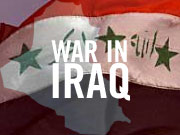Audio
Photos
Your Voice
| ||||||||||||||||||||||||
Bush blames terrorists, former loyalists to Saddam, for surge of violence in Iraq
October 28, 2003
 |
| President Bush answers questions during a Rose Garden news conference on Tuesday, October 28, 2003. (MPR file photo) |
Washington, D.C. — (AP) President Bush blamed both loyalists to Saddam Hussein and foreign terrorists for the recent rash of devastating attacks in and around Baghdad.
"Basically what they're trying to do is cause people to run...That's what terrorists do," Bush told a Rose Garden news conference Tuesday.
Turning to the California wildfires, Bush expressed "my deep concerns and sympathies for those whose lives have been hurt badly by these fires."
"The federal government is working closely with the state government to provide the resources necessary to help the brave firefighters do their duty," he said.
Bush said the United States was working closely with Syria and Iran to try to prevent foreign fighters from entering Iraq and was stepping up border patrols.
Speaking nearly six months after he declared major combat operations to have ended in the wartorn country, Bush denied that he was surprised at the continuing level of violence.
"It is dangerous in Iraq because there are some who believe that we are soft, that the will of the United States can be shaken by suiciders," he said.
Still, Bush added, "The world is safer today because Saddam Hussein and the Taliban are gone...Reconstruction is difficult and freedom still has its enemies in both of those countries."
Bush spoke on a day when a car bomb exploded near a police station in Fallujah, 40 miles west of Baghdad, killing several people. That came a day after a series of suicide bombings in Baghdad left about three dozen dead and more than 200 wounded.
The coordinated attacks came against the Red Cross headquarters in Baghdad and three police stations.
Bush was asked who was behind the recent wave of attacks.
"We're trying to determine the nature of who these people were, but I would assume that they're either - or and probably both - Baathists and foreign terrorists," he said.
The Baathists, those loyal to the ousted Iraqi leader, "try to create chaos and fear because they realize that a free Iraq will deny them the excessive privilege they had under Saddam Hussein," Bush said.
"The foreign terrorists are trying to create conditions of fear and retreat because they fear a free and peaceful state," the president said in his first full-fledged news conference since July 31.
Bush made his statement about dangers in Iraq in response to a question about a private memo Secretary of Defense Donald H. Rumsfeld wrote to aides earlier this month. In that memo, Rumsfeld said he was concerned about the slow pace of the war against terrorism.
Bush defended his campaign to put a positive spin on events in Iraq against criticism that his administration is not giving Americans the true story.
"I can't put it any more plainly. Iraq's a dangerous place. That's leveling," he said.
But, he added: "There's more than just terrorist attacks that are taking place in Iraq. ... I was just saying, we've got to look at the whole picture, that what the terrorists would like is for people to focus only on the conditions which create fear, and that is the death and the toll being taken."
"We have the right strategy" on Iraq, Bush said. But he added that the ground commanders will have to decide if tactics should be changed to meet the present threat.
The best way to prevent against terror attacks, he said, was to "harden targets" and to persuade more Iraqis to cooperate with U.S. and British occupation forces.
Turning to efforts to achieve peace between Israel and the Palestinians, Bush said it would be hard to make any progress so long as terror attacks by Palestinian militants continued.
"It's essential that there be a focused effort to fight off terror," he said.
Bush repeated earlier criticism of Israel's construction of a barrier to fence off certain Palestinian areas.
"I have said that the fence is a problem to the extent that the fence is an opportunity to make it difficult for a Palestinian state to emerge," the president said. "There is a difference between security and land acquisition."
Bush called on the House and Senate to reconcile their remaining differences on spending legislation to pay for Iraqi reconstruction and "reach agreement soon on a final bill."
Turning to domestic matters, the president said that after a long period of sluggishness, "Our economy is showing signs of broad and gathering strength."
Bush also called on Congress to pass Medicare reform and an energy bill and he insisted that the Senate take up-or-down votes on his nominees to fill vacancies on the federal, district and circuit courts.
Because a small group of senators is "willfully obstructing the process, some of these nominees have been denied up-or-down votes for months, even years," he said.
The president said an FBI investigation into the leak of the identity of a CIA officer was continuing. "This investigation is ongoing, and by professionals who do this for a living."
On other topics, Bush:
- Said his brother, Florida Gov. Jeb Bush, "made the right decision" in ordering a feeding tube reinserted in a severely brain-damaged woman in a contentious right-to-life case.
- Said he would sign a bill to ban certain late-term abortions once it reaches his desk. Congress finished work on the measure last week. Still, Bush said, he does not believe that either Congress or the general public is in favor of banning all abortions.
|
News Headlines
|
Related Subjects
|

